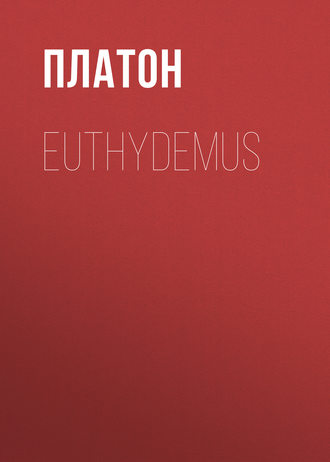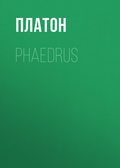
Платон
Euthydemus
To appreciate fully the drift of the Euthydemus, we should imagine a mental state in which not individuals only, but whole schools during more than one generation, were animated by the desire to exclude the conception of rest, and therefore the very word 'this' (Theaet.) from language; in which the ideas of space, time, matter, motion, were proved to be contradictory and imaginary; in which the nature of qualitative change was a puzzle, and even differences of degree, when applied to abstract notions, were not understood; in which there was no analysis of grammar, and mere puns or plays of words received serious attention; in which contradiction itself was denied, and, on the one hand, every predicate was affirmed to be true of every subject, and on the other, it was held that no predicate was true of any subject, and that nothing was, or was known, or could be spoken. Let us imagine disputes carried on with religious earnestness and more than scholastic subtlety, in which the catchwords of philosophy are completely detached from their context. (Compare Theaet.) To such disputes the humour, whether of Plato in the ancient, or of Pope and Swift in the modern world, is the natural enemy. Nor must we forget that in modern times also there is no fallacy so gross, no trick of language so transparent, no abstraction so barren and unmeaning, no form of thought so contradictory to experience, which has not been found to satisfy the minds of philosophical enquirers at a certain stage, or when regarded from a certain point of view only. The peculiarity of the fallacies of our own age is that we live within them, and are therefore generally unconscious of them.
Aristotle has analysed several of the same fallacies in his book 'De Sophisticis Elenchis,' which Plato, with equal command of their true nature, has preferred to bring to the test of ridicule. At first we are only struck with the broad humour of this 'reductio ad absurdum:' gradually we perceive that some important questions begin to emerge. Here, as everywhere else, Plato is making war against the philosophers who put words in the place of things, who tear arguments to tatters, who deny predication, and thus make knowledge impossible, to whom ideas and objects of sense have no fixedness, but are in a state of perpetual oscillation and transition. Two great truths seem to be indirectly taught through these fallacies: (1) The uncertainty of language, which allows the same words to be used in different meanings, or with different degrees of meaning: (2) The necessary limitation or relative nature of all phenomena. Plato is aware that his own doctrine of ideas, as well as the Eleatic Being and Not-being, alike admit of being regarded as verbal fallacies. The sophism advanced in the Meno, 'that you cannot enquire either into what you know or do not know,' is lightly touched upon at the commencement of the Dialogue; the thesis of Protagoras, that everything is true to him to whom it seems to be true, is satirized. In contrast with these fallacies is maintained the Socratic doctrine that happiness is gained by knowledge. The grammatical puzzles with which the Dialogue concludes probably contain allusions to tricks of language which may have been practised by the disciples of Prodicus or Antisthenes. They would have had more point, if we were acquainted with the writings against which Plato's humour is directed. Most of the jests appear to have a serious meaning; but we have lost the clue to some of them, and cannot determine whether, as in the Cratylus, Plato has or has not mixed up purely unmeaning fun with his satire.
The two discourses of Socrates may be contrasted in several respects with the exhibition of the Sophists: (1) In their perfect relevancy to the subject of discussion, whereas the Sophistical discourses are wholly irrelevant: (2) In their enquiring sympathetic tone, which encourages the youth, instead of 'knocking him down,' after the manner of the two Sophists: (3) In the absence of any definite conclusion – for while Socrates and the youth are agreed that philosophy is to be studied, they are not able to arrive at any certain result about the art which is to teach it. This is a question which will hereafter be answered in the Republic; as the conception of the kingly art is more fully developed in the Politicus, and the caricature of rhetoric in the Gorgias.
The characters of the Dialogue are easily intelligible. There is Socrates once more in the character of an old man; and his equal in years, Crito, the father of Critobulus, like Lysimachus in the Laches, his fellow demesman (Apol.), to whom the scene is narrated, and who once or twice interrupts with a remark after the manner of the interlocutor in the Phaedo, and adds his commentary at the end; Socrates makes a playful allusion to his money-getting habits. There is the youth Cleinias, the grandson of Alcibiades, who may be compared with Lysis, Charmides, Menexenus, and other ingenuous youths out of whose mouths Socrates draws his own lessons, and to whom he always seems to stand in a kindly and sympathetic relation. Crito will not believe that Socrates has not improved or perhaps invented the answers of Cleinias (compare Phaedrus). The name of the grandson of Alcibiades, who is described as long dead, (Greek), and who died at the age of forty-four, in the year 404 B.C., suggests not only that the intended scene of the Euthydemus could not have been earlier than 404, but that as a fact this Dialogue could not have been composed before 390 at the soonest. Ctesippus, who is the lover of Cleinias, has been already introduced to us in the Lysis, and seems there too to deserve the character which is here given him, of a somewhat uproarious young man. But the chief study of all is the picture of the two brothers, who are unapproachable in their effrontery, equally careless of what they say to others and of what is said to them, and never at a loss. They are 'Arcades ambo et cantare pares et respondere parati.' Some superior degree of wit or subtlety is attributed to Euthydemus, who sees the trap in which Socrates catches Dionysodorus.
The epilogue or conclusion of the Dialogue has been criticised as inconsistent with the general scheme. Such a criticism is like similar criticisms on Shakespeare, and proceeds upon a narrow notion of the variety which the Dialogue, like the drama, seems to admit. Plato in the abundance of his dramatic power has chosen to write a play upon a play, just as he often gives us an argument within an argument. At the same time he takes the opportunity of assailing another class of persons who are as alien from the spirit of philosophy as Euthydemus and Dionysodorus. The Eclectic, the Syncretist, the Doctrinaire, have been apt to have a bad name both in ancient and modern times. The persons whom Plato ridicules in the epilogue to the Euthydemus are of this class. They occupy a border-ground between philosophy and politics; they keep out of the dangers of politics, and at the same time use philosophy as a means of serving their own interests. Plato quaintly describes them as making two good things, philosophy and politics, a little worse by perverting the objects of both. Men like Antiphon or Lysias would be types of the class. Out of a regard to the respectabilities of life, they are disposed to censure the interest which Socrates takes in the exhibition of the two brothers. They do not understand, any more than Crito, that he is pursuing his vocation of detecting the follies of mankind, which he finds 'not unpleasant.' (Compare Apol.)
Education is the common subject of all Plato's earlier Dialogues. The concluding remark of Crito, that he has a difficulty in educating his two sons, and the advice of Socrates to him that he should not give up philosophy because he has no faith in philosophers, seems to be a preparation for the more peremptory declaration of the Meno that 'Virtue cannot be taught because there are no teachers.'
The reasons for placing the Euthydemus early in the series are: (1) the similarity in plan and style to the Protagoras, Charmides, and Lysis; – the relation of Socrates to the Sophists is still that of humorous antagonism, not, as in the later Dialogues of Plato, of embittered hatred; and the places and persons have a considerable family likeness; (2) the Euthydemus belongs to the Socratic period in which Socrates is represented as willing to learn, but unable to teach; and in the spirit of Xenophon's Memorabilia, philosophy is defined as 'the knowledge which will make us happy;' (3) we seem to have passed the stage arrived at in the Protagoras, for Socrates is no longer discussing whether virtue can be taught – from this question he is relieved by the ingenuous declaration of the youth Cleinias; and (4) not yet to have reached the point at which he asserts 'that there are no teachers.' Such grounds are precarious, as arguments from style and plan are apt to be (Greek). But no arguments equally strong can be urged in favour of assigning to the Euthydemus any other position in the series.
EUTHYDEMUS
PERSONS OF THE DIALOGUE: Socrates, who is the narrator of the Dialogue. Crito, Cleinias, Euthydemus, Dionysodorus, Ctesippus.
SCENE: The Lyceum.
CRITO: Who was the person, Socrates, with whom you were talking yesterday at the Lyceum? There was such a crowd around you that I could not get within hearing, but I caught a sight of him over their heads, and I made out, as I thought, that he was a stranger with whom you were talking: who was he?
SOCRATES: There were two, Crito; which of them do you mean?
CRITO: The one whom I mean was seated second from you on the right-hand side. In the middle was Cleinias the young son of Axiochus, who has wonderfully grown; he is only about the age of my own Critobulus, but he is much forwarder and very good-looking: the other is thin and looks younger than he is.
SOCRATES: He whom you mean, Crito, is Euthydemus; and on my left hand there was his brother Dionysodorus, who also took part in the conversation.
CRITO: Neither of them are known to me, Socrates; they are a new importation of Sophists, as I should imagine. Of what country are they, and what is their line of wisdom?
SOCRATES: As to their origin, I believe that they are natives of this part of the world, and have migrated from Chios to Thurii; they were driven out of Thurii, and have been living for many years past in these regions. As to their wisdom, about which you ask, Crito, they are wonderful – consummate! I never knew what the true pancratiast was before; they are simply made up of fighting, not like the two Acarnanian brothers who fight with their bodies only, but this pair of heroes, besides being perfect in the use of their bodies, are invincible in every sort of warfare; for they are capital at fighting in armour, and will teach the art to any one who pays them; and also they are most skilful in legal warfare; they will plead themselves and teach others to speak and to compose speeches which will have an effect upon the courts. And this was only the beginning of their wisdom, but they have at last carried out the pancratiastic art to the very end, and have mastered the only mode of fighting which had been hitherto neglected by them; and now no one dares even to stand up against them: such is their skill in the war of words, that they can refute any proposition whether true or false. Now I am thinking, Crito, of placing myself in their hands; for they say that in a short time they can impart their skill to any one.
CRITO: But, Socrates, are you not too old? there may be reason to fear that.
SOCRATES: Certainly not, Crito; as I will prove to you, for I have the consolation of knowing that they began this art of disputation which I covet, quite, as I may say, in old age; last year, or the year before, they had none of their new wisdom. I am only apprehensive that I may bring the two strangers into disrepute, as I have done Connus the son of Metrobius, the harp-player, who is still my music-master; for when the boys who go to him see me going with them, they laugh at me and call him grandpapa's master. Now I should not like the strangers to experience similar treatment; the fear of ridicule may make them unwilling to receive me; and therefore, Crito, I shall try and persuade some old men to accompany me to them, as I persuaded them to go with me to Connus, and I hope that you will make one: and perhaps we had better take your sons as a bait; they will want to have them as pupils, and for the sake of them willing to receive us.
CRITO: I see no objection, Socrates, if you like; but first I wish that you would give me a description of their wisdom, that I may know beforehand what we are going to learn.
SOCRATES: In less than no time you shall hear; for I cannot say that I did not attend – I paid great attention to them, and I remember and will endeavour to repeat the whole story. Providentially I was sitting alone in the dressing-room of the Lyceum where you saw me, and was about to depart; when I was getting up I recognized the familiar divine sign: so I sat down again, and in a little while the two brothers Euthydemus and Dionysodorus came in, and several others with them, whom I believe to be their disciples, and they walked about in the covered court; they had not taken more than two or three turns when Cleinias entered, who, as you truly say, is very much improved: he was followed by a host of lovers, one of whom was Ctesippus the Paeanian, a well-bred youth, but also having the wildness of youth. Cleinias saw me from the entrance as I was sitting alone, and at once came and sat down on the right hand of me, as you describe; and Dionysodorus and Euthydemus, when they saw him, at first stopped and talked with one another, now and then glancing at us, for I particularly watched them; and then Euthydemus came and sat down by the youth, and the other by me on the left hand; the rest anywhere. I saluted the brothers, whom I had not seen for a long time; and then I said to Cleinias: Here are two wise men, Euthydemus and Dionysodorus, Cleinias, wise not in a small but in a large way of wisdom, for they know all about war, – all that a good general ought to know about the array and command of an army, and the whole art of fighting in armour: and they know about law too, and can teach a man how to use the weapons of the courts when he is injured.
They heard me say this, but only despised me. I observed that they looked at one another, and both of them laughed; and then Euthydemus said: Those, Socrates, are matters which we no longer pursue seriously; to us they are secondary occupations.
Indeed, I said, if such occupations are regarded by you as secondary, what must the principal one be; tell me, I beseech you, what that noble study is?
The teaching of virtue, Socrates, he replied, is our principal occupation; and we believe that we can impart it better and quicker than any man.
My God! I said, and where did you learn that? I always thought, as I was saying just now, that your chief accomplishment was the art of fighting in armour; and I used to say as much of you, for I remember that you professed this when you were here before. But now if you really have the other knowledge, O forgive me: I address you as I would superior beings, and ask you to pardon the impiety of my former expressions. But are you quite sure about this, Dionysodorus and Euthydemus? the promise is so vast, that a feeling of incredulity steals over me.
You may take our word, Socrates, for the fact.
Then I think you happier in having such a treasure than the great king is in the possession of his kingdom. And please to tell me whether you intend to exhibit your wisdom; or what will you do?
That is why we have come hither, Socrates; and our purpose is not only to exhibit, but also to teach any one who likes to learn.
But I can promise you, I said, that every unvirtuous person will want to learn. I shall be the first; and there is the youth Cleinias, and Ctesippus: and here are several others, I said, pointing to the lovers of Cleinias, who were beginning to gather round us. Now Ctesippus was sitting at some distance from Cleinias; and when Euthydemus leaned forward in talking with me, he was prevented from seeing Cleinias, who was between us; and so, partly because he wanted to look at his love, and also because he was interested, he jumped up and stood opposite to us: and all the other admirers of Cleinias, as well as the disciples of Euthydemus and Dionysodorus, followed his example. And these were the persons whom I showed to Euthydemus, telling him that they were all eager to learn: to which Ctesippus and all of them with one voice vehemently assented, and bid him exhibit the power of his wisdom. Then I said: O Euthydemus and Dionysodorus, I earnestly request you to do myself and the company the favour to exhibit. There may be some trouble in giving the whole exhibition; but tell me one thing, – can you make a good man of him only who is already convinced that he ought to learn of you, or of him also who is not convinced, either because he imagines that virtue is a thing which cannot be taught at all, or that you are not the teachers of it? Has your art power to persuade him, who is of the latter temper of mind, that virtue can be taught; and that you are the men from whom he will best learn it?
Certainly, Socrates, said Dionysodorus; our art will do both.
And you and your brother, Dionysodorus, I said, of all men who are now living are the most likely to stimulate him to philosophy and to the study of virtue?
Yes, Socrates, I rather think that we are.
Then I wish that you would be so good as to defer the other part of the exhibition, and only try to persuade the youth whom you see here that he ought to be a philosopher and study virtue. Exhibit that, and you will confer a great favour on me and on every one present; for the fact is I and all of us are extremely anxious that he should become truly good. His name is Cleinias, and he is the son of Axiochus, and grandson of the old Alcibiades, cousin of the Alcibiades that now is. He is quite young, and we are naturally afraid that some one may get the start of us, and turn his mind in a wrong direction, and he may be ruined. Your visit, therefore, is most happily timed; and I hope that you will make a trial of the young man, and converse with him in our presence, if you have no objection.
These were pretty nearly the expressions which I used; and Euthydemus, in a manly and at the same time encouraging tone, replied: There can be no objection, Socrates, if the young man is only willing to answer questions.
He is quite accustomed to do so, I replied; for his friends often come and ask him questions and argue with him; and therefore he is quite at home in answering.
What followed, Crito, how can I rightly narrate? For not slight is the task of rehearsing infinite wisdom, and therefore, like the poets, I ought to commence my relation with an invocation to Memory and the Muses. Now Euthydemus, if I remember rightly, began nearly as follows: O Cleinias, are those who learn the wise or the ignorant?
The youth, overpowered by the question blushed, and in his perplexity looked at me for help; and I, knowing that he was disconcerted, said: Take courage, Cleinias, and answer like a man whichever you think; for my belief is that you will derive the greatest benefit from their questions.
Whichever he answers, said Dionysodorus, leaning forward so as to catch my ear, his face beaming with laughter, I prophesy that he will be refuted, Socrates.
While he was speaking to me, Cleinias gave his answer: and therefore I had no time to warn him of the predicament in which he was placed, and he answered that those who learned were the wise.
Euthydemus proceeded: There are some whom you would call teachers, are there not?
The boy assented.
And they are the teachers of those who learn – the grammar-master and the lyre-master used to teach you and other boys; and you were the learners?
Yes.
And when you were learners you did not as yet know the things which you were learning?
No, he said.
And were you wise then?
No, indeed, he said.
But if you were not wise you were unlearned?
Certainly.
You then, learning what you did not know, were unlearned when you were learning?
The youth nodded assent.
Then the unlearned learn, and not the wise, Cleinias, as you imagine.
At these words the followers of Euthydemus, of whom I spoke, like a chorus at the bidding of their director, laughed and cheered. Then, before the youth had time to recover his breath, Dionysodorus cleverly took him in hand, and said: Yes, Cleinias; and when the grammar-master dictated anything to you, were they the wise boys or the unlearned who learned the dictation?







